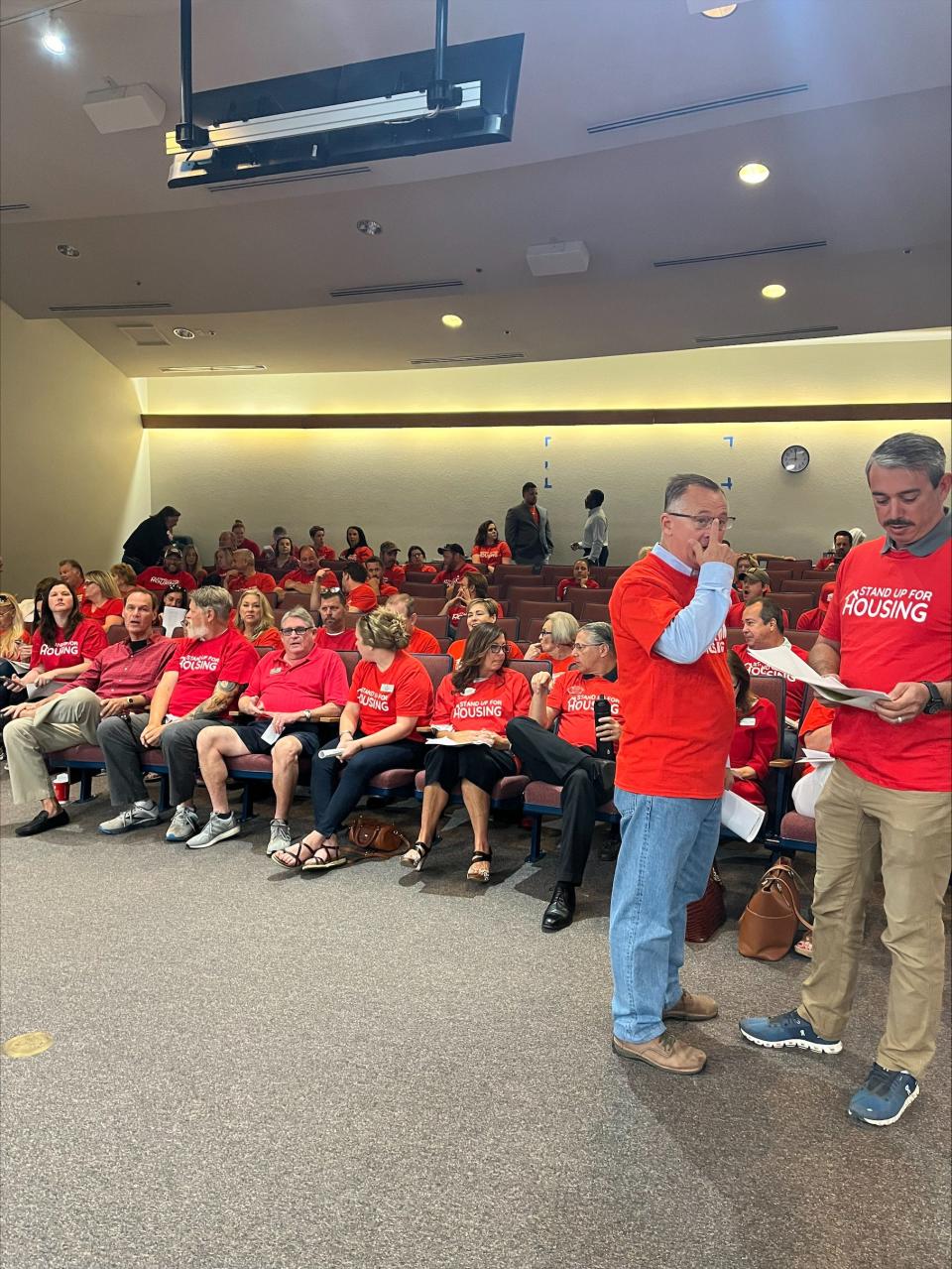From protecting trees to raising fees, Santa Rosa takes a 2nd look at land development code
The debate is on as Santa Rosa County Commissioners embark for the second time in three years to retool the county's Land Development Code.
People with ties to the housing profession showed up en masse wearing red shirts that said "Stand Up for Housing." They were there to protest fees and regulations that they could be forced to bear as the result of new provisions added to the draft of the code reviewed Monday at a workshop set up to give commissioners a first chance to debate proposed changes.
Alton Listor, the government affairs chairman for the Homebuilders Association of West Florida, told commissioners that the last round of Land Development Code adjustments in 2021 had placed an additional $17,000 in fees and regulatory costs on the backs of homebuilders, and without changes, this year version will add an additional $22,000.
"That's $39,000 between 2021 and today," he said.

More like this: Plans to turn 40 acres in Milton from agriculture to residential land gets rezoning denial
Related: Santa Rosa commissioner seeks smaller buffer between some bars and churches. Here's why.
Also in attendance were members of the public who want to see more done to protect the environment. They contend the rate of development and deficient protections in place to preserve green spaces, protect trees and prevent sediment from entering already impaired waterways spaces are killing the county.
"Clear cutting and fill and bill development are the root of all evil," said Dara Hartigan, the president of the group Save Our Soundside.
Commissioners made it very clear that there would be no votes taken Monday and that much more discussion will occur before any changes to the code are finalized.
Most of the morning was spent going over the long list under consideration for addition or deletion from the code. County staff is looking at everything from protecting "heritage" trees over 48 inches to clarifying parking requirements.
It appeared from general discussion that Commission Chairman Colten Wright will have the number of votes he needs among board members to amend the code to do away with a 2,500 foot buffer in his district between schools and churches and businesses that serve alcoholic beverages.
Easily the most discussed single proposed change of the day, Colten explained that in his district 5, which consists nearly exclusively of properties developed along U.S. Highway 98, those who would open a brew pub or restaurant are often thwarted by the sheer number of schools and churches that exist along the roadway. The 2,500 buffer, he said, extends nearly a mile in both directions from the several religious or educational facilities on the roadway.
He said his proposal to allow for the schools and churches to coexist with their alcohol-serving neighbors would exclude development next door to one another.
"The thought process was we're not trying to give shots of tequila to kindergarteners or close down any churches," he said. "Santa Rosa County is a great place to live. I'd like it to be a great place to live, work and play."
Commissioner Sam Parker said he would go along with Wright's proposal.
Parker said he himself doesn't drink alcoholic beverages and that in his job as a deputy he had seen the damage it can do to people. He said he favored the the idea of the change because he doesn't think the county should be in the business of "regulating peoples' business."
"If people like Commissioner Wright want to go have a drink, I don't got anything against that," Parker said.
Wright said he first began thinking of proposing the code amendment after an American Legion was unable to locate at a new home due to the restrictive alcohol ordinance. Commissioner James Calkins said he could not support the change to the amendment but would be willing to consider variances when an organization like an American Legion or Veterans of Foreign Wars organization requests one.
Lighthouse Christian growth: Milton and Lighthouse Christian College team up to buy a downtown area building
He later learned that due to a change to the Land Development Code made in 2008, no variances are allowed on the 2,500 foot zone as it is set now.
Commissioner Kerry Smith said he would also support the change to the code suggested by Wright and would favor that option over a policy of approving or denying variance requests. That, he said, could put the county at risk of a lawsuit.
While there were some protests from the audience over the removal of the 2,500 foot no alcohol zone, several American Legion members were on hand to speak in support.
A somewhat surprising nod in support of the amendment change came from Joanna Johannes, the president and CEO of Lighthouse Christian College.
The school has campuses in Pensacola, Gulf Breeze and Okaloosa County.
"I'm not offended by responsible growth within our area," she said. "We need a place for our colleagues, teachers and students. There are not enough places for people to get together. We are in favor of revising that."
This article originally appeared on Pensacola News Journal: Santa Rosa County Land Development Code back up for review, changes

